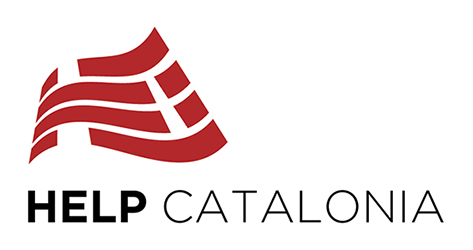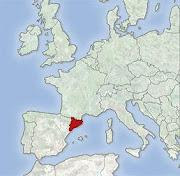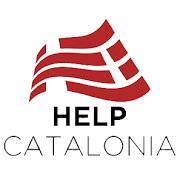“Very moved, very moved, to receive such a (inaudible) the greatest honour that I have received.
And because you spoke of what I have thought all my life, inspired by my mother, who was a wonderful, genial woman. She talked to me, very early of my age, about peace. About peace. That, at that time, also we had, we were... I was born in the middle of a war. So, everything that the United Nations goes to my heart. Yes. And I have followed all the time what the UN was doing. Now, excuse me if I take your time, and our time, but let me say one thing....
I am a Catalan. Today, a province of Spain. But what has been Catalonia? Catalonia has been the greatest nation in the world. I tell you... I will tell you why. Catalonia has had the first parliament, much before England. Catalonia had the beginning of the United Nations. All the authorities of Catalonia in the Eleventh Century met in a city of France, at that time Catalonia, to speak about peace, at the Eleventh Century. Peace in the world and against, against, against wars, the inhumanity of wars. This was Catalonia. Now I am so so happy, so happy, so moved to be here with you today...”
“I haven't played in public for nearly forty years. I have to play today. And I will play a short piece of the Catalonian folklore. This piece is called The Song of the Birds. The birds in the space sing peace, peace, peace. And the music is a music that Bach and Beethoven and all the greats would have loved and admired. It is so beautiful, and it is also the soul of my country, Catalonia.”
These words are, even today, the most striking avowal ever made before a prominent international body on "the soul of my people, Catalonia." The cellist, composer and conductor Pau Casals (1876-1973) spoke in English before the General Assembly of the United Nations.
It was on October 24, 1971 when Casals was honoured at the New York headquarters of the United Nations, where he had already performed in 1959, and again in 1963 when he played El pessebre (The Nativity). The Secretary General of the UN, Burma's U Thant presented him with the Peace Medal, and the Catalan musician –about to celebrate his 95th birthday– conducted the Hymn to the United Nations he had composed, with the lyrics by poet W.H. Auden. Upon completing the performance, Casals turned a blind eye to protocol and pronounced these emotive words. Then the stirring notes of the Cant dels ocells (The Birdsong) struck out in that enormous hall, infused of the magnificent solitude of the Maestro. As he reminded those present, he had not played his cello in public for a long time –maintaining his instrument as silent as his own country– but the occasion was well worth it.
However, Casals' hymn never became the official anthem of the UN, as U Thant would have liked. For political and moral reasons, the pairing of Casals and Auden was not the most appropriate for those years, still in the midst of the Cold War, with many countries under dictatorships and with the superpowers unwilling to shake up the scenario, shrouded as they were in an essentially conservative moral. Notwithstanding, the hymn has become the “Hymn to Peace” and is so known and performed today.
Pau Casals –known as Pablo in the English- and Spanish-speaking worlds– was a musician of great international prestige –he even received a posthumous Grammy award as late as 1989– not just for making notable innovations in cello performance early in his career, adopted by cellists in general, but also as a tireless promoter of both the popularization of classical music and of the cause for peace and freedom. A good example of his commitment was the creation, along with other musicians, of the École Normale de Musique in Paris in 1920, and the Workers' Music Association in Barcelona in 1926, with the aim of bringing classical music to the working class.
Casals, who in 1931 had organised a concert celebrating the proclamation of the Spanish Republic, two years later rejected an invitation to play with the Berliner Philharmonisches Orchester in 1933, also in Barcelona. It was his way of decidedly and unswervingly opposing any totalitarian ideology, in that case Adolf Hitler's rise to power and the early Nazi persecutions. Already in 1917, he had publicly announced he would not return to Russia as long as there was an undemocratic Communist regime. With the passing of the years, Casals would remain firm in refusing to perform in any totalitarian state.
After Fascist General Franco's victory, which finished off the Republic, right from the beginning he showed his support for his compatriots interned at the refugee concentration camps in France. Between 1938 and 1940, Casals –whose international recognition as a musician went uninterrupted– organised charity concerts and moved heaven and earth to collect donations, and personally gave 140,000 francs for Catalans in exile, fundamentally through two organisations which he supported, namely the Chaînes du Bonheur International and Spanish Refugee Aid.
Living his own exile in Puerto Rico –where his mother, that “wonderful, genial woman”, the granddaughter of Catalan emigrants, had been born– after having rejected invitations during two decades, Casals accepted an invitation to give a concert at the United Nations in October 1958. His call to action before the nuclear threat and the message of peace he added –recorded previously in Geneva and broadcast in 40 countries– made him a symbol of the struggle for liberty – with the permanent background score of that Song of the Birds, the traditional Catalan song, stylised by his bow that always accompanied him.
Two years later, in his role as a universal ambassador for peace, Casals began a close relationship corresponding with John F. Kennedy, then President elect of the United States, always writing of the struggle for freedom – throughout the world, and also for his fondly reminisced homeland, Catalonia. In 1961, Kennedy made him an exceptional invitation to play at the White House –thus repeating the musician's first performance at the US Presidents' official residence in 1904 before Theodore Roosevelt. Indeed, as a result the American press drew analogies between Kennedy and Roosevelt as leaders committed to culture, precisely with Casals as the nexus. Kennedy eventually awarded Casals the Presidential Medal of Freedom in 1963.
The freedom Pau Casals defended with all the strength of his music and the tenacity of his character, until his death in Puerto Rico in 1973, still in exile. Freedom in peace for people, for languages, cultures and countries. For his people too, for his language, his culture, his country: Catalonia. “The greatest nation in the world.”
First Minister and Minister of the Presidency of Catalonia 2004-2006
Minister of Education of Catalonia 2003-2004
Councillor in Torredembarra Town Council (1995-2003)
From 2010 he is Professor at the University Rovira i Virgili
Year 2013, same speech:














